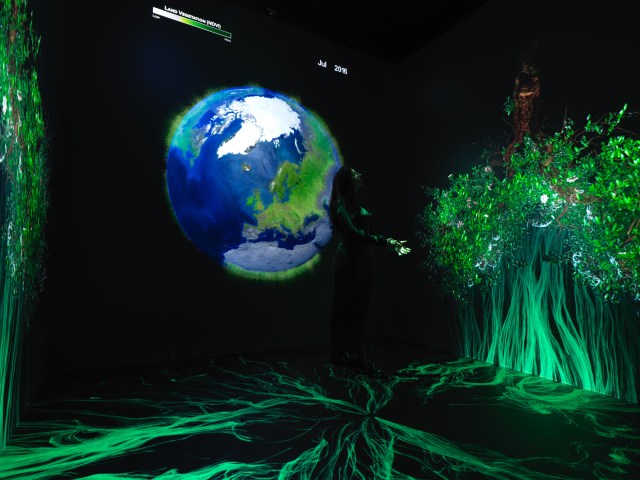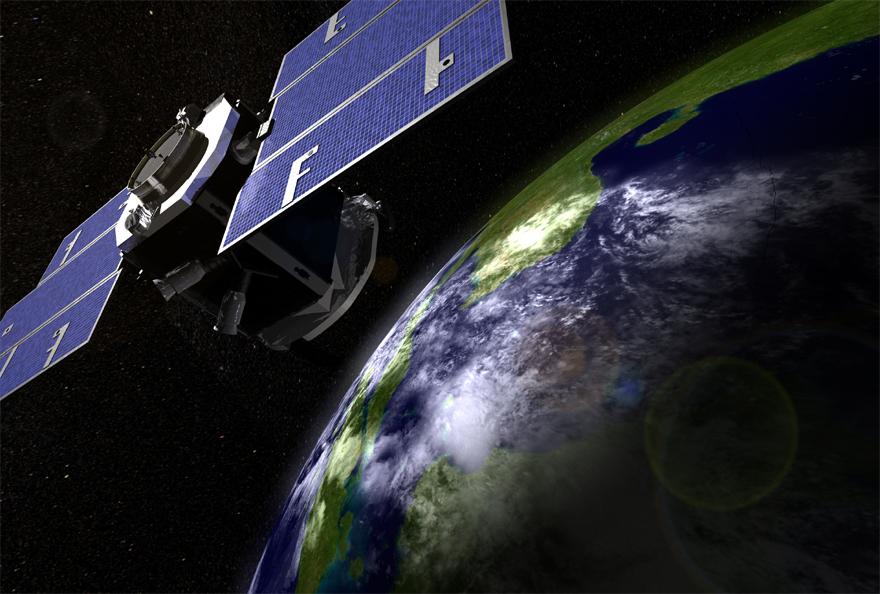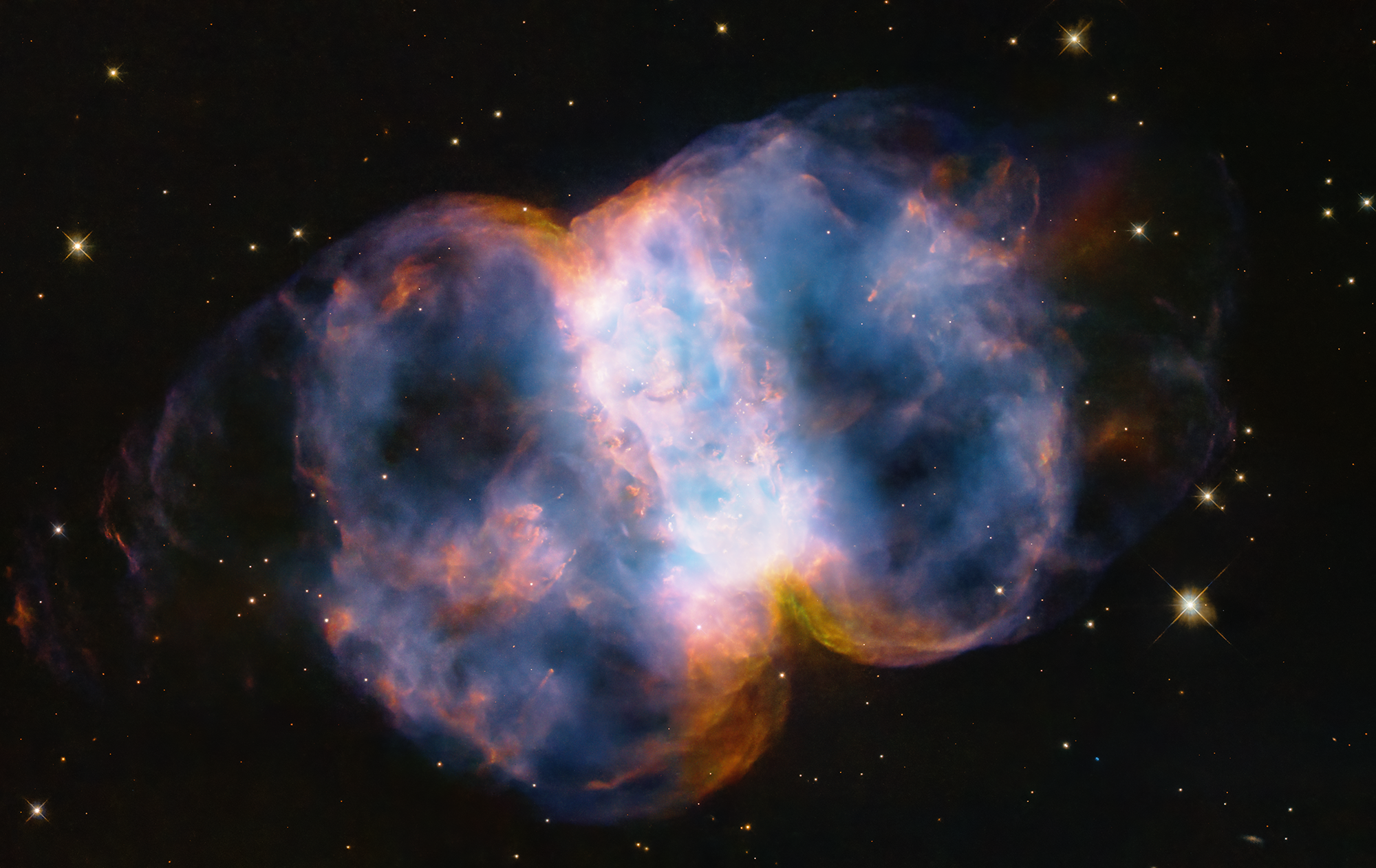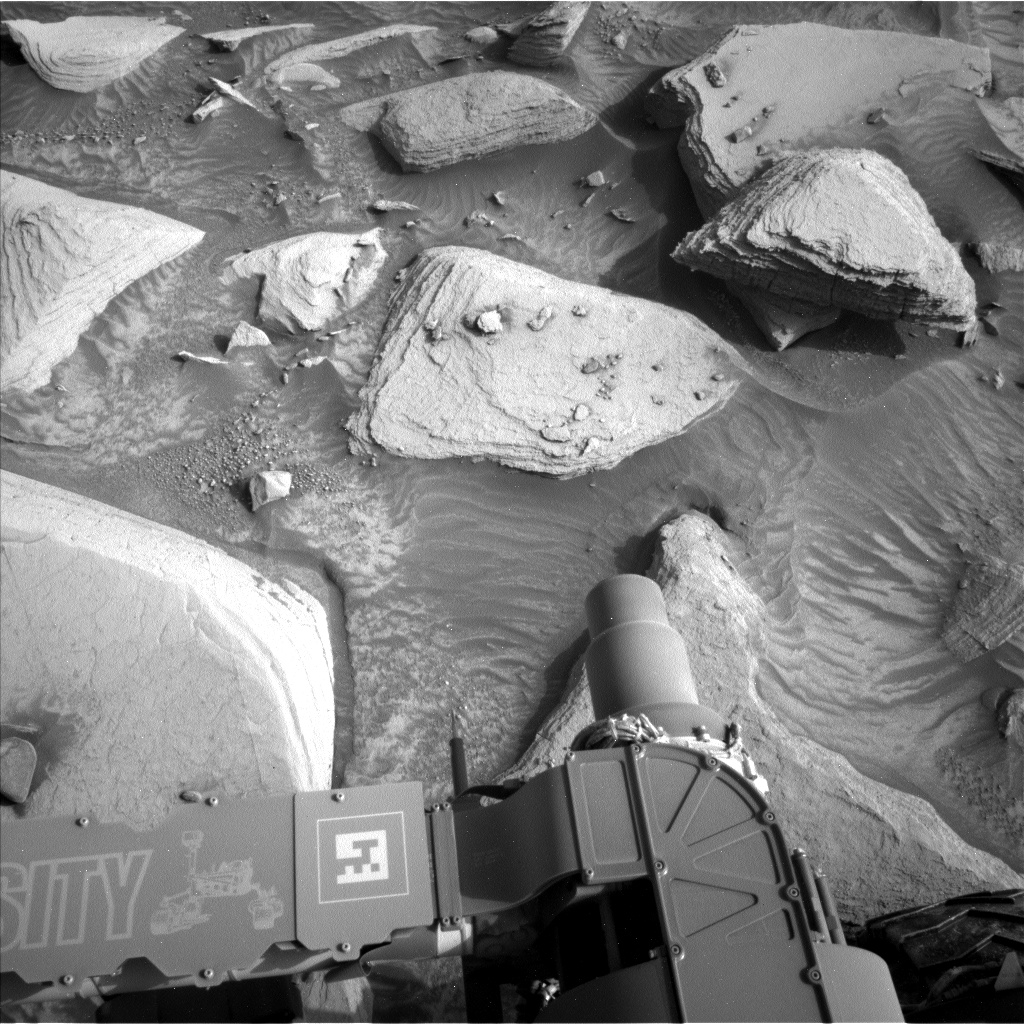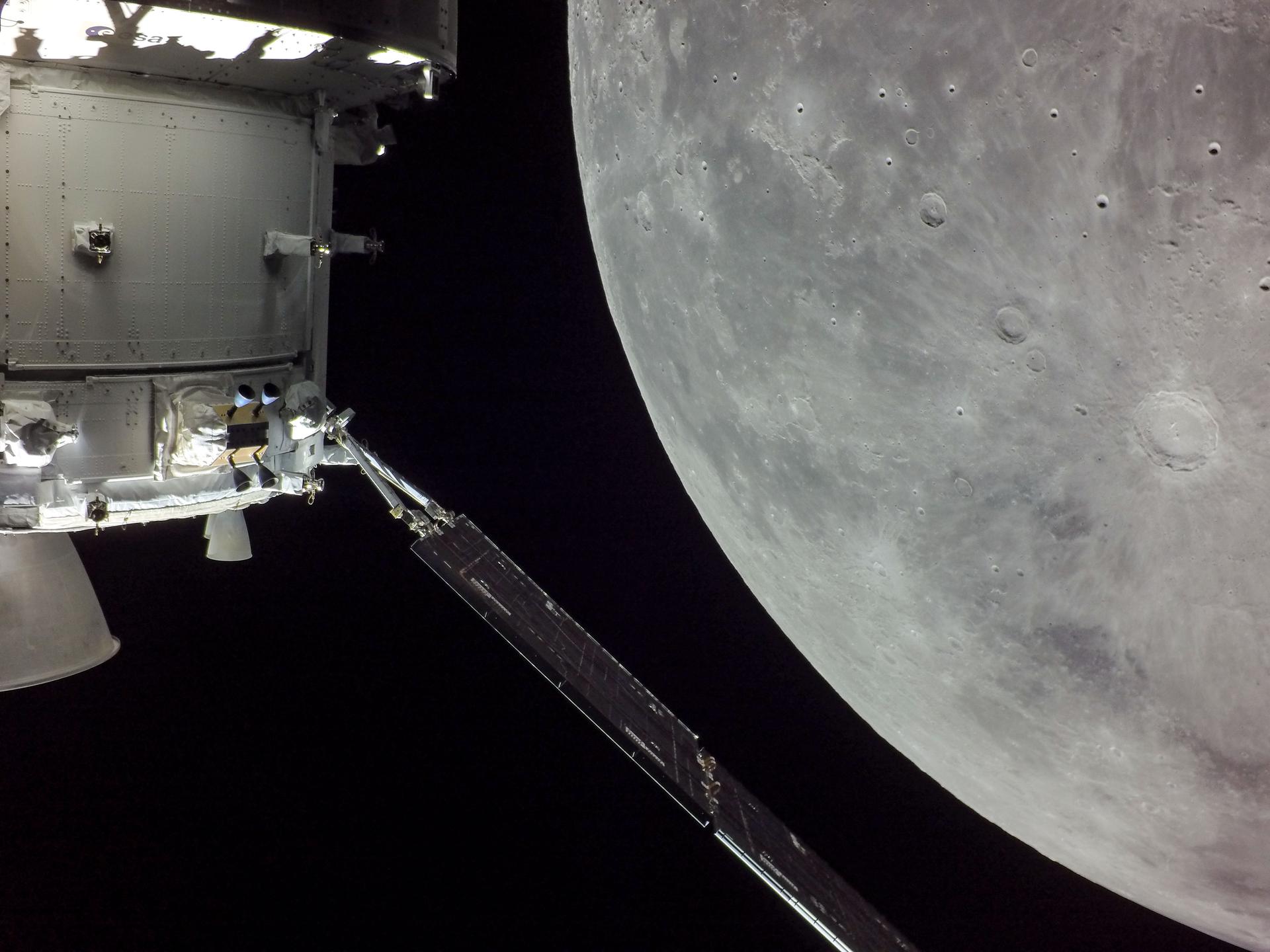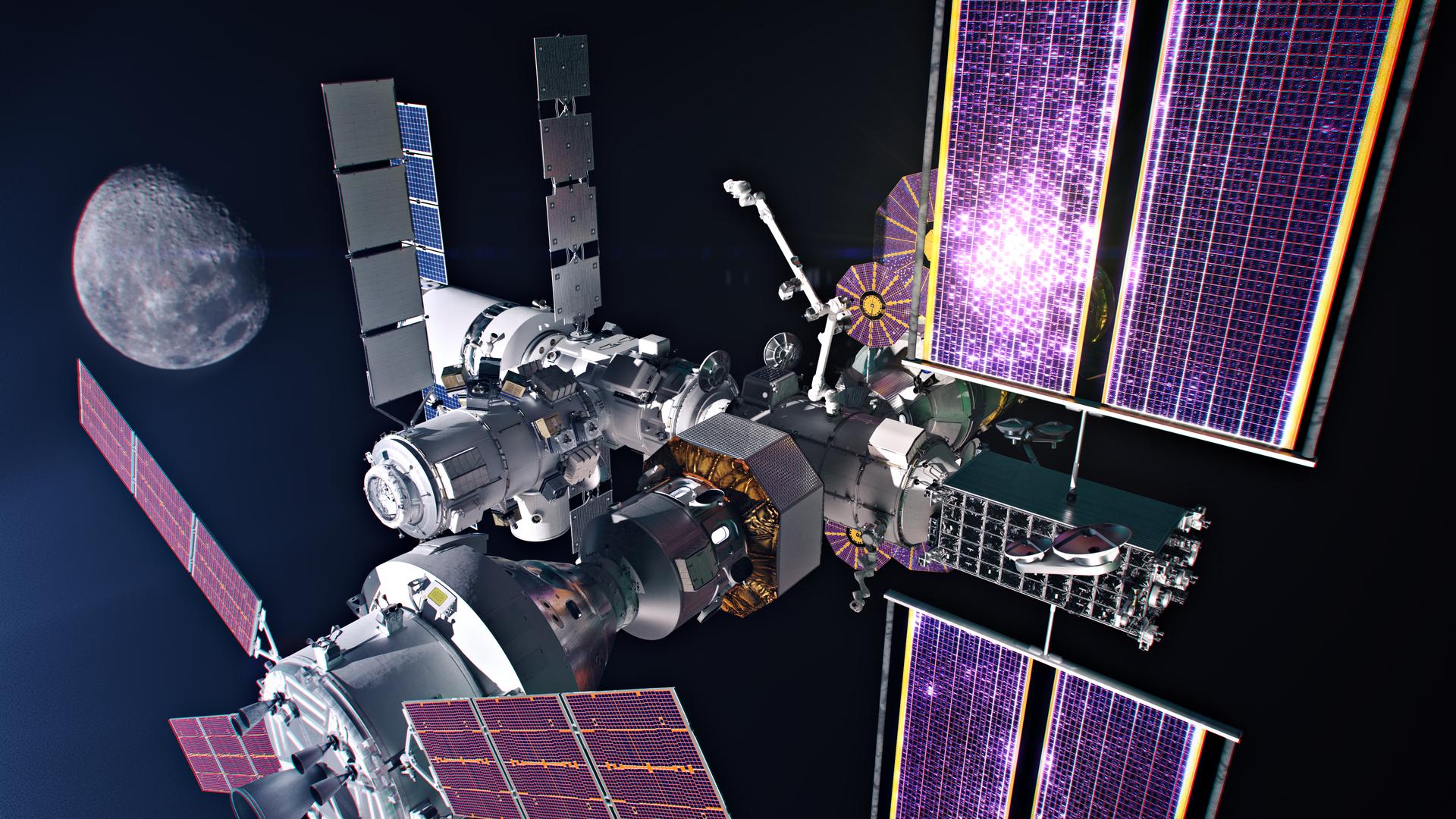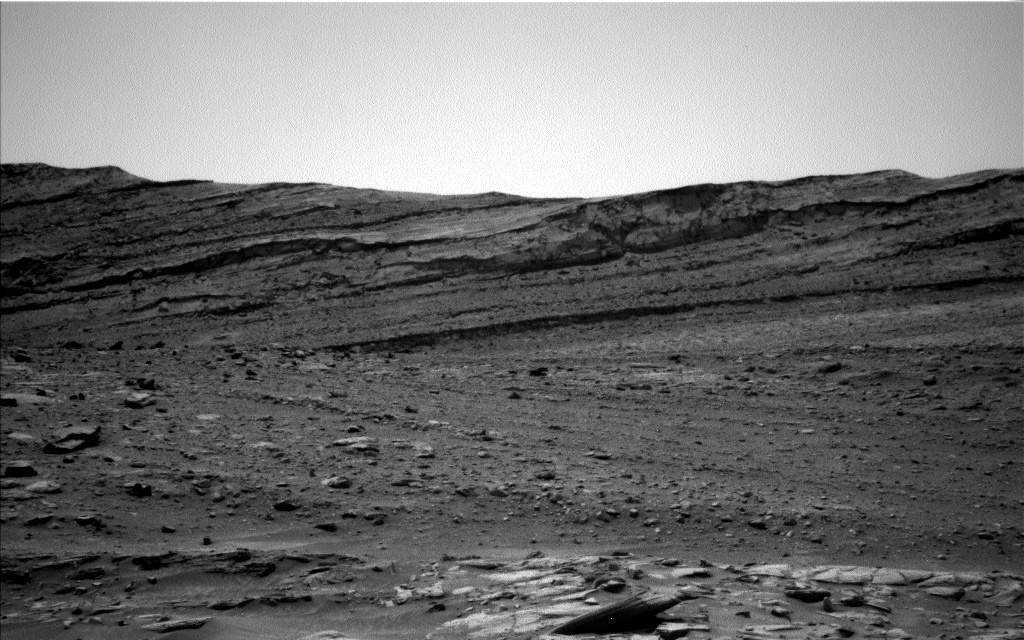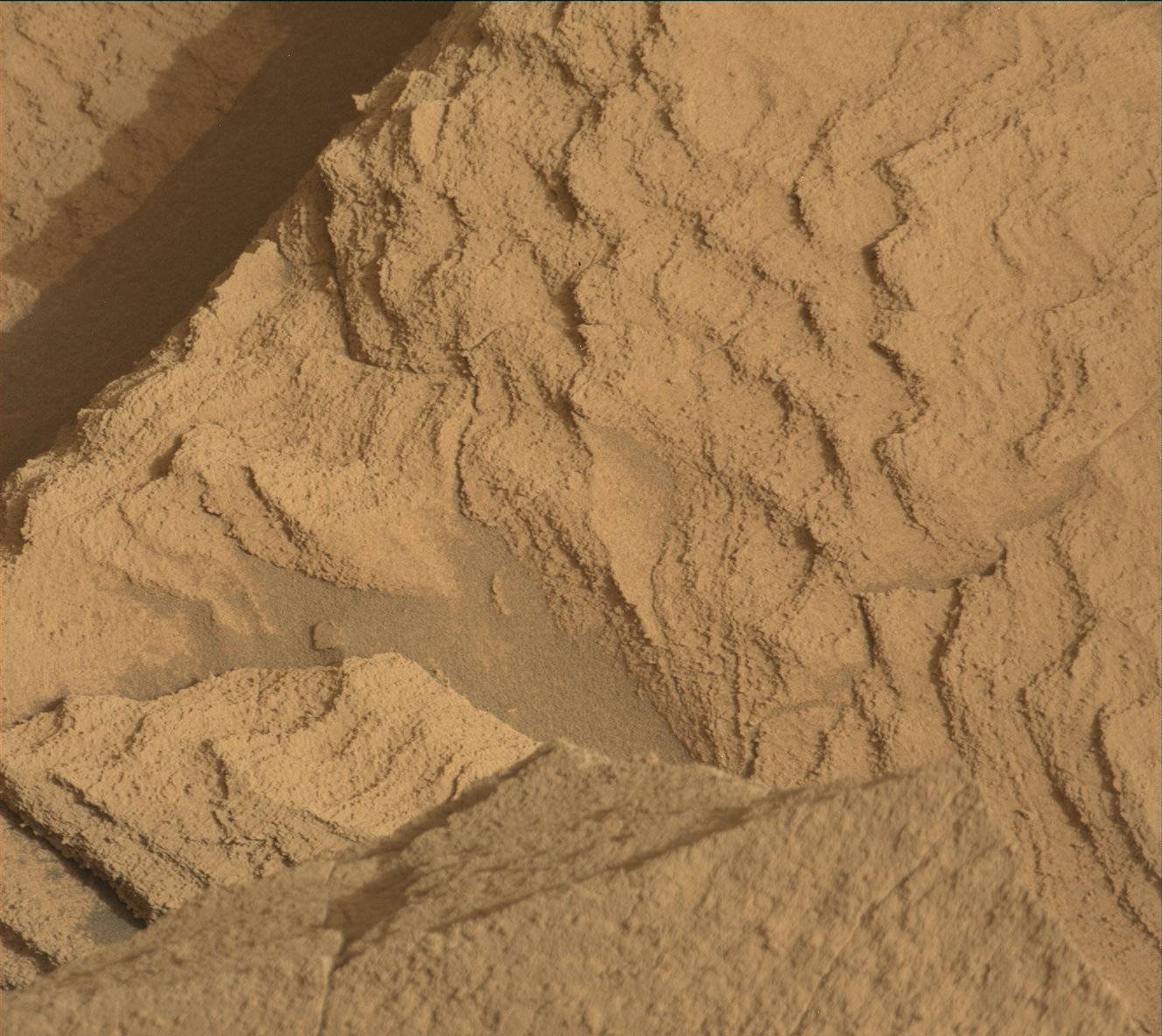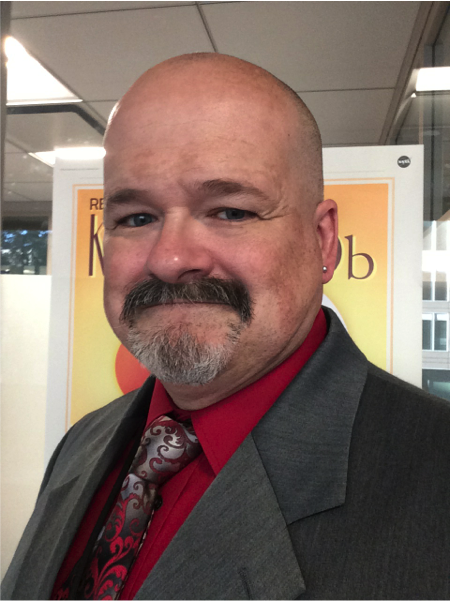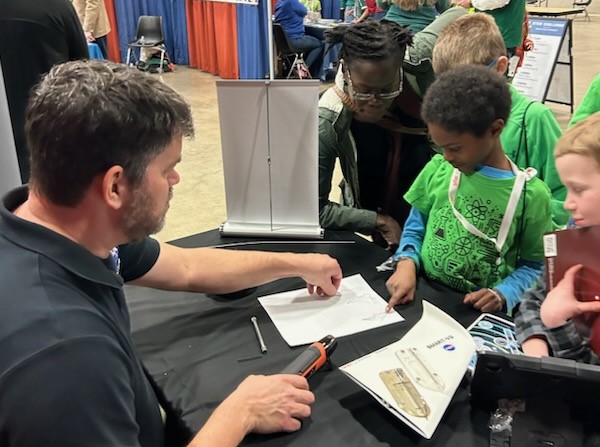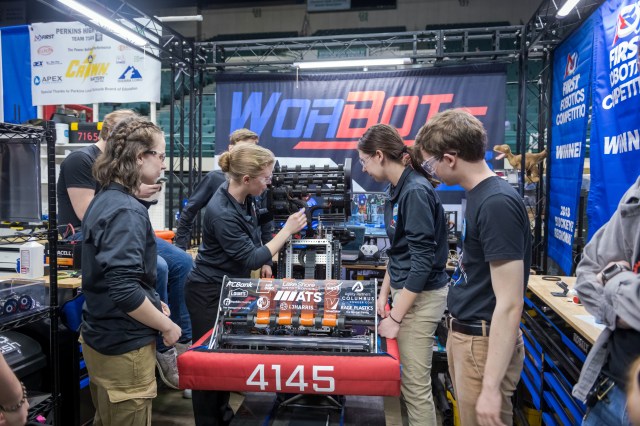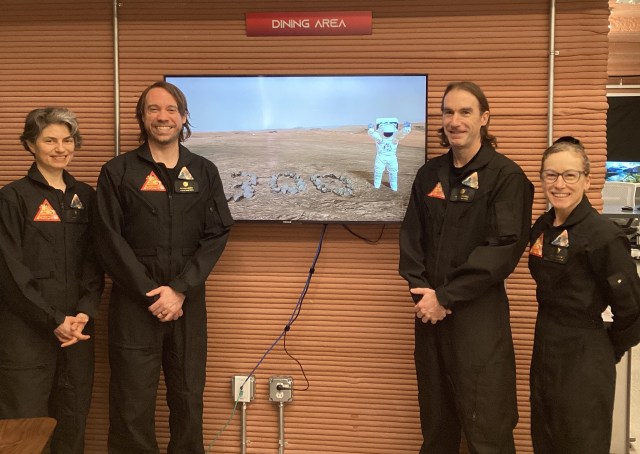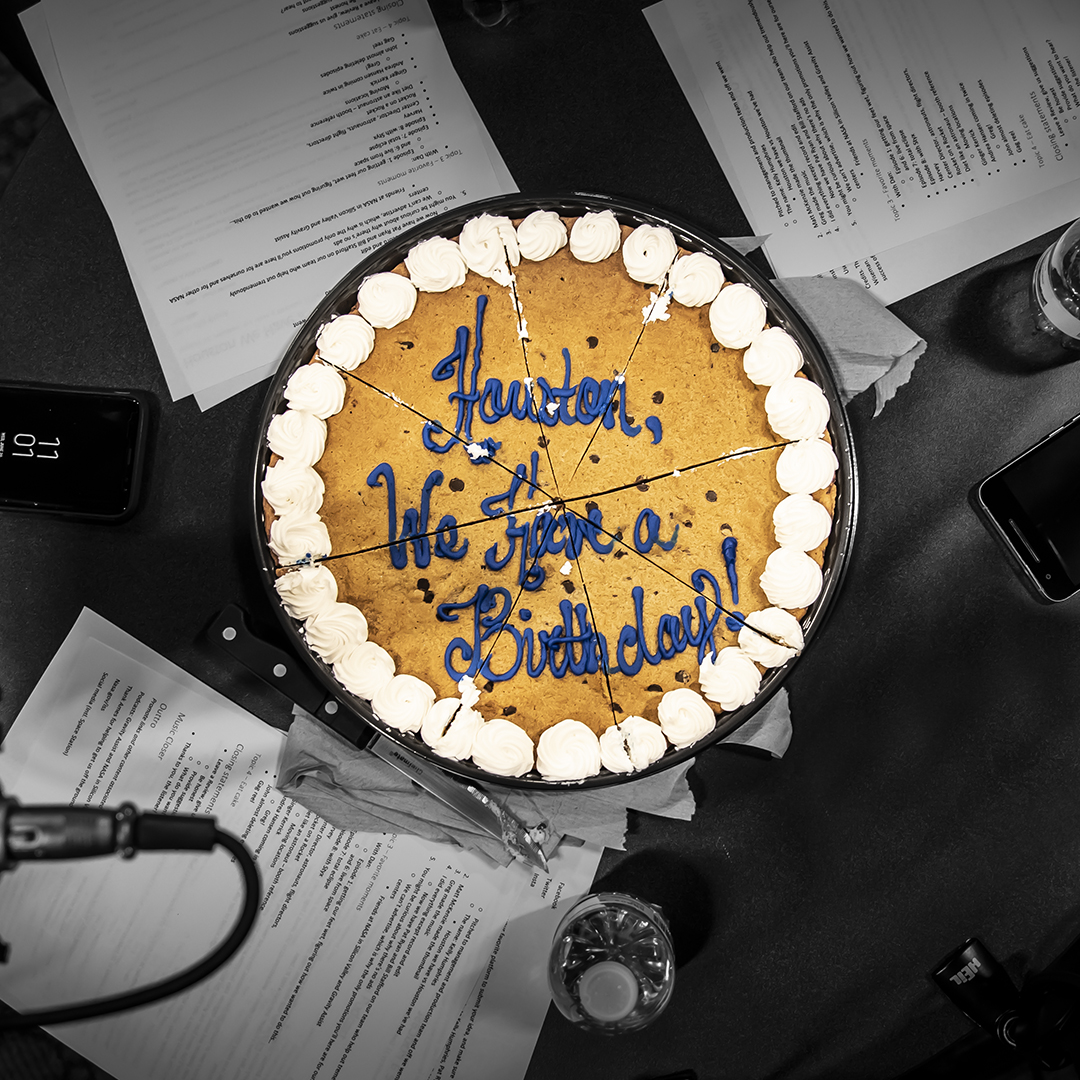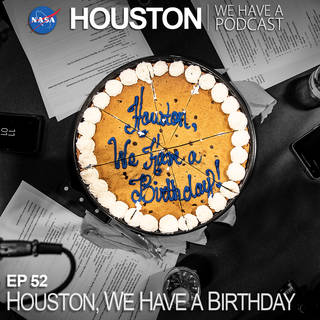
“Houston We Have a Podcast” is the official podcast of the NASA Johnson Space Center, the home of human spaceflight, stationed in Houston, Texas. We bring space right to you! On this podcast, you’ll learn from some of the brightest minds of America’s space agency as they discuss topics in engineering, science, technology and more. You’ll hear firsthand from astronauts what it’s like to launch atop a rocket, live in space and re-enter the Earth’s atmosphere. And you’ll listen in to the more human side of space as our guests tell stories of behind-the-scenes moments never heard before.
For Episode 52, Houston, We Have a Podcast celebrates its first year. Gary Jordan (host) sits down with Alex Perryman (audio) and Dan Huot (co-host) to reminisce about their favorite moments and incredible guests. This episode was recorded on June 20, 2018.
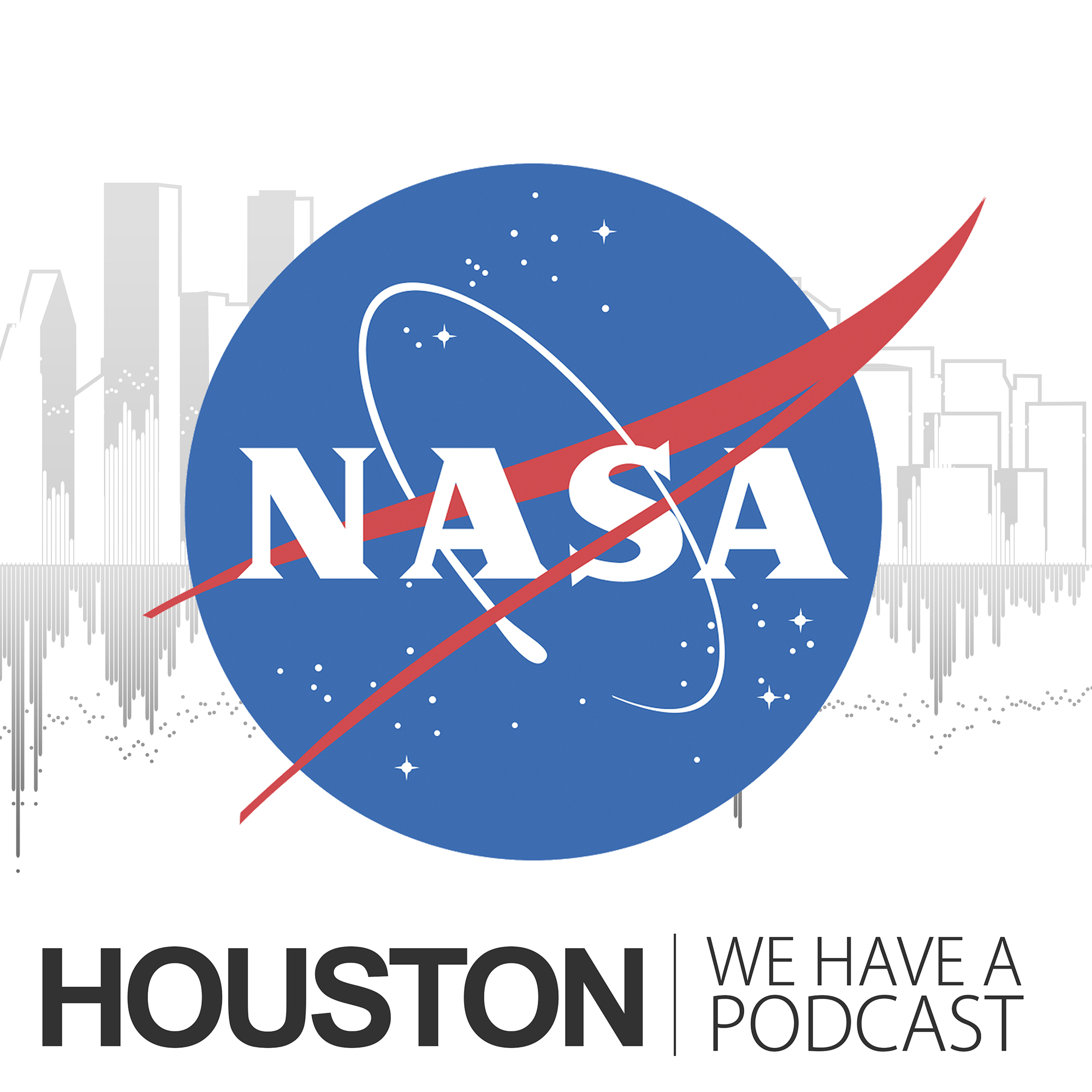
Transcript
Gary Jordan (Host): Houston, we have a birthday. Welcome to the official award-winning podcast of the NASA Johnson Space Center. This is Houston, We Have a Podcast, and we just won the Silver Excalibur Award from the Public Relations Society of America just recently. So yes, we’re an award-winning podcast. Thank you for joining us. This is episode 52, our annual anniversary. Because one year ago — I guess tomorrow — from the release of this podcast we just started with episode one of Houston, We Have a Podcast, and what a ride it’s been. So we’ve brought in so many different scientists, engineers, and astronauts to talk about a huge variety of topics and share their incredible stories. So to celebrate a year of Houston, We Have a Podcast, I brought in the podcast team to go in front of the mics this time. So today I’m talking with producer, audio engineer, and I like to call audio wizard, Alex Perryman. And then we’re also bringing in Dan Huot, who’s been a guest, co-host, and a host for the show.
We’ll talk about how the podcast got started and reflect on some of our favorite moments. So if you’re new to the show, this will give you a nice snapshot of some of the conversations we’ve had so far. So with no further delay, let’s go light speed once again and jump right ahead to our talk with the podcast team of Houston, We Have a Podcast. Enjoy.
[ Music ]
Host:All right, guys. It’s been a year.
Alex Perryman:
Host:Happy birthday. Happy birthday. We got a cake in the middle, it says Houston, we have a birthday. You’re welcome.
Alex Perryman:Thank you, thank you. Since Dan’s not going to say anything, thank you.
Dan Huot:I’m just — I was just thinking, like, we were so close to starting the podcast on Alex Perryman scholastic achievement day, but we just missed it but, like, a week or so.
Alex Perryman:Yay.
Host:Wait is it — oh, it was last week?
Alex Perryman:Yeah, it was June 12th.
Host:How did I miss that? Was I away?
Dan Huot:It was on the work calendar.
Alex Perryman:No, you were here.
Host:I was here, but you thought I wasn’t here.
Alex Perryman:Yeah.
Host:Okay, I’m sorry. Happy work achievement day.
Alex Perryman:Thank you.
Host:I should know, I see you, like, multiple times a week.
Alex Perryman:Oh, yeah.
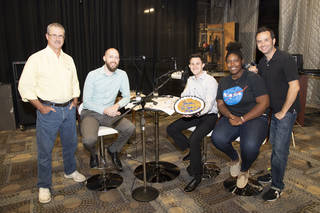
Host:Yeah, that would be cool. Well, so today is the one-year anniversary. One year ago tomorrow, I guess, by the time this releases it will be one year of Houston, We Have a Podcast. I didn’t think that that happened. We were just kind of doing the podcast, and then next thing you know, a year goes by. And so I thought this would be a perfect time to get all of us together, the guys that have been doing the podcast since the beginning, and just sort of reminisce and talk about the podcast. End especially for new listeners this is a perfect opportunity to really get into some of the best moments and really — if you’re just tuning in, this is kind of the highlights, some of the moments that really got us started here. But, you know, I always say, you know, thanks to producer Alex at the end of the movie or producer Alex, cue the music, you know? But we don’t know anything about producer Alex. So let’s start there. Who is producer Alex?
Alex Perryman:Well, producer Alex is Alex Perryman. I went to Full Sail University for audio engineering. So I come from a music background. So this is a little different for me. But audio is audio [Laughs].
Dan Huot:I almost feel like we should caveat Alex has the coolest life ever, so strap in.
Alex Perryman:[Laughs] Yeah, the strap in. It’s not as extravagant as Dan is making it seem.
Dan Huot:Yea, now live up to that.
Alex Perryman:Gary Jordan: Yeah, yeah, thanks, no pressure here. But I just — you know, I have some pretty cool friends, know some cool people.
Host:Wow. Okay, I won’t just leave it. Do you want to talk about who it is or you want to just leave it there and remain —
Alex Perryman:Well, I mean, I do know some Grammy-award winning producers and engineers in the music industry. So it’s kind of cool to have those as your Facebook friends so they can brag all day on Facebook about working with Beyonce here recently, which was what I saw.
Host:What?
Alex Perryman:And so — yeah [Laughs].
Host:Man, you got the connections.
Alex Perryman:Oh, yeah.
Host:So wait, you were into music first, what kind of music were you doing?
Alex Perryman:Any kind. It didn’t really matter as long as it had a beat.
Host:That’s really good music, then.
Alex Perryman:Yeah, there you go.
Host:All right. So what’s some of the favorite music that you’ve actually produced?
Alex Perryman:I do a lot of music for games personally. So I love doing, like, gaming music and driving music. Not the, you know, elevator music that will put you to sleep, but the music, like, “Oh, I’m on a road trip. It sounds like I’m on a road trip,” that type of music.
Host:[Laughs] All right. So Dan added that you have one of the coolest jobs ever; what is it that you’re doing here, here at NASA?
Alex Perryman:So here at NASA, outside of being the audio wizard for the podcast, I work with the ISS on a lot of their live in-flight events. I’m the voice that gets to talk to them at the end of the live event. So I say my one awesome line and then I sign off. But it’s cool because it’s heard in space. So I get to go bed at night knowing that.
Host:Let’s do it here, what’s the line?
Alex Perryman:Station, this is Houston ACR. That concludes the event.
[ Applause ]
[ Multiple Speakers ]
Dan Huot:Literally chills right now. It might be because the room’s 30 degrees.
[ Laughter ]
Host:That is the voice, that’s awesome. So you’re constantly — like, you’re doing events, and your voice is in space. And you have — I mean, the audio control room, I’ve been there before, it’s awesome. It’s so cool.
Alex Perryman:It’s like a spaceship.
Host:It is, you’re getting feeds from space all the time. You actually get to communicate to and from — well, to space, right?
Alex Perryman:Yeah.
Host:This concludes the event. Right?
Alex Perryman:Yeah, I don’t get to communicate from space. That would be cool, though, if I could go up there and just end the event there, that would be nice.
[ Laughter ]
Host:Just float by the camera, right?
Alex Perryman: Yeah.
Host:That concludes the event. [Laughs] All right, Dan, you have been on the podcast. You were the first guest I had. We kind of sat down for episode one, and it wasn’t — actually, it wasn’t planned to be episode one when we first did it. It was, like, let’s just see how podcasts could go.
Dan Huot:Yeah, we set bar low.
Host:[Laughs] And I was host and you were the guest. And we talked about the International Space Station and just had a conversation. And I think it’s the most popular episode, I think, to this day.
Dan Huot:That sounds about right. [Laughs] You know, I remember after we finished walking out and thinking, “Man, that was so much fun.” Because at the end of the day our job is to talk about space. And that was — hey, Dan, sit in front of his microphone and talk about space for 45 minutes to an hour and don’t shut up the entire time because that’s what we actually want. And that was fantastic. It was such a blast to do. And I still don’t listen to too many podcasts, but I can tell you making them has been a lot of fun.
Host:Yeah.
[ Music ] It has been described as one of the greatest engineering feats in human history.
Dan Huot:Not to toot our own horn, but we would certainly — I would certainly argue that building a football-sized million-pound spacecraft in space is definitely up there.
Host:Yeah.
[ Music ] Oh, yeah. I listen to a ridiculous amount of podcasts. That’s actually how it got started, is I moved up to the city and my commute — well, you know, my commute started when I was really close to here, in Clear Lake to NASA I was 15 minutes. So that was —
Alex Perryman:Lucky.
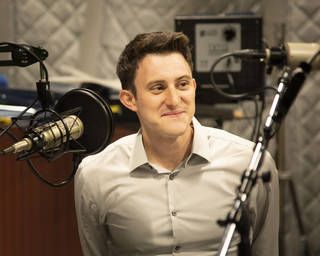
Host:Yeah, just — yeah, right? Turn on the music or whatever. It doesn’t have to be anything — I did listen to my own music, but it could be the radio because it’s really, really short. But when your commute goes up to an hour both ways, you know, you need to fill that time. So I just started listening to podcasts because there’s so many of them. And obviously the first thing you do if you work at the Johnson Space Center is, like, what kind of space podcasts are out there? So you start looking. And NASA had a few, but they weren’t, like, I don’t know, podcasts, right?
Alex Perryman:They were more like shows just put in audio.
Host:Highlight shows almost. So, like, two-minute recaps. So I thought — I was like, “We should make one.” I think the only one at the time was NASA in Silicon Valley. That was the only true podcast. Everything else was just, like, highlights or they took space-to-ground and they just took the audio from it, the two-minute highlight show that we do every week. And I was like, “I bet you we could do this.” So I researched the industry and found out that lots of people listen to podcasts. Who knew, right? This industry is enormous. It’s been growing exponentially every single year. So I thought it was almost prudent for us to enter into that space. And here we are. It took us a while to actually get off the ground just because we had to — we had to build it from scratch and I had to figure out how to do a podcast, how to create weekly content, and how to make sure we did everything right. Because NASA has a particular way of doing things.
We got to go out through NASA.gov versus any other sort of podcast feed or anything. But yeah, so that’s kind of how it —
Dan Huot:And we had to explain what a podcast was to a lot of people.
Host:Yeah, yeah, that was a huge part of it, was I had to research the industry and come up with statistic and present to management and say, “We should do this.”
Dan Huot:But then it was all the fun stuff. What are we going to call it? What is it going look like?
Host:[Laughs] What are we going to call it was fun. Do you remember us coming up with the huge list of names?
Alex Perryman:Oh my gosh.
Host:It was enormous. And it was actually Kelly Humphreys who came up with Houston, We Have a Podcast. So props to him.
Dan Huot:Knocked it out of the park.
Host:Yeah.
Alex Perryman:[Multiple speakers] perfect.
Dan Huot:Because coming up with the name, it’s almost like you hear it and you’re like, “Dibs, band name,” because it’s so hard to come up with something that just sounds almost natural. You always do the test, like, “Hey, did you listen to insert X hear last week?” And that was, I think, the first or really the only one that got pitched that it was like, “Yep, that’s it.”
Host:That’s the one [Laughs].
Dan Huot:Lock it down.
Host:Honestly, at that point there was no other options.
Dan Huot:No.
Host:It was just — it was too perfect.
Dan Huot:Yeah.
Host:And originally to hear. Well, actually, it was Houston, we’ve had a problem I think is the original quote. But we couldn’t say we’ve had a podcast because we have one. We have one right now.
[ Laughter ] So we had to do that. All right, Dan, I want to know a little bit more about your background. How did you get here to NASA?
Dan Huot:I was poor and I needed money.
[ Laughter ]
Alex Perryman:Join the club.
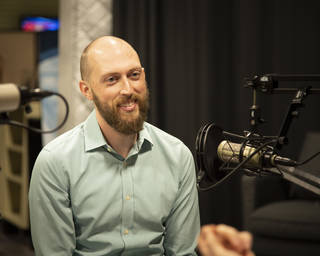
Dan Huot:No, so that is kind of the genesis of it. I was in school, I was in college still and my roommate and I were sitting around. And we had just gotten done with week three of eating hotdogs bought in bulk. And we were like, “We should probably try and make some money.” So we figured let’s go get internships. And so thankfully I went to school that had a really well-set up student employment program where — a co-op program where I walked in and was immediately presented with a list of companies. And they said, “Pick which ones you want and you’ll get an interview.” And I was like, “Oh, that’s easy.” And NASA was on the list. And I was a business major in school. So my first thought was, “What the heck am I going to do at NASA?” I went to school with nothing but engineers. So I was constantly reminded I am not an engineering. And so then I saw this and I was like, “Why would I go to NASA?” And they said, “No, they’re just like any other engineering company even where you still have business functions. You can go do budget and contracts.”
And that didn’t sound super exciting, but it was NASA, so I said, “Yeah, sign me up.” So I interviewed and I got the position. So I came in as an intern, as a student, and I spent an entire semester in a budget office. To put it lightly, it was not for me. I knew that pretty quickly. But since it was a co-op program that NASA still does — name drop for the co-op program if you’re a student; go apply because it’s incredible — you get to come back for multiple tours. And they always told us try to get outside your comfort zone, see what else the center has to offer. And I said, well, I always loved writing. I liked talking. Let me go see if I can go do public affairs. That sounds like fun. So they brought me in. It was super intimidating. They made me do a writing test and, you know, we need to see if you’re up to snuff. Pat’s laughing at me. [Laughs] But I passed. And I got to come out, and I was a student. And I mean, I came out, we were still flying Shuttle at the time.
And so I spent a summer in public affairs and it was during — STS-125 was the first Shuttle mission that I vividly remember. And that was — Pat was probably doing commentary. You were doing Orbit 2. So that means Pat was one of the people in mission control, you know, giving live in on orbit 2. So that was the exciting one probably when they were doing space walks and stuff. So that mission was the last time we fixed Hubble. And that was the last time we did space walks out of the Shuttle airlock. So it was a really exciting mission. There was a big IMAX movie that was made out of it. I mean, it was incredible. And that got me hooked. And then I just kept coming back and refused to leave [Laughs]. And thankfully, they offered me a job by the time I graduated. So it worked out.
Host:That’s true. That’s one of the good things about the co-op program, right, as long as you do refuse to leave, you keep coming back —
Dan Huot:Chances are good.
Host:— your chances are pretty good.
Dan Huot:That you might be here at NASA.
Alex Perryman:He’s got to weigh them down a little bit, it’s all right.
[ Laughter ]
Host:You know, that was actually — that was my thing, too. I started off as a business major myself. And I knew pretty early I wanted to do marketing. So I joined the marketing association. And I loved films, so I was making a bunch of, like, commercials and stuff for the marketing association. But I was having sort of a, I don’t know, some moment where I was kind of second-guessing myself that maybe marketing wasn’t for me. And so I was thinking about switching to supply chain. And the career fair was coming up for my sophomore year, and I decided not to go. So I went to my morning classes. And it was college, so I went to my morning classes and I was done by, like, 10:30 [Laughs]. I went to home and I changed and just sat on the couch. And I was watching TV.
Alex Perryman:Very productive.
Host:Very productive, yeah. I was a good student.
Dan Huot:Career fair, future? Nah. TV.
Host:Yeah, right. And so two of my friend, Nick Penos [assumed spelling] and Chris Walton busted into my door, both suits, and they say, “Gary, what are you doing?” [Laughs] And I go, “Nothing. That’s what I’m doing.” And they said, “Get your suit on, print out your resume, and come to the career fair.” And I was like, “I don’t really want to go.” And they said, “But you’re going.” And I said, “Okay, fine.”
Alex Perryman:Peer pressure.
Host:Yeah, right. So I went to the career fair. And they printed out my name, and it said business administration on it because I didn’t even declare my major yet because I was only a sophomore. I had my resume in hand and just everything that I was doing with the Penn State marketing association. And I circled the career fair. It was in the Bryce Jordan Center of Penn State, which is just a big — it’s their basketball stadium but it’s a stadium and it was completely filled. It was, like, one of the biggest career fairs. So I just circled it and that took me an hour. But I didn’t see anything that really stuck out to me except for NASA. Everything — you know, because I was already second-guessing what I wanted to do. But NASA had these banners that had, like, you know, people floating in the microgravity plane and working on robots. And I was like, “That looks cool.” And I was like, “Well, I guess I’ll just stand in line.” So I stood in line and so did a lot of other people. And I was looking around at their badges and it said aerospace engineer, aerospace engineer, mechanical engineer, electrical engineer. I’m like, “I do not belong here. What am I doing in this line?”
And I was like, “What do I have to lose? I mean, I don’t really want to interview with anyone else.” So I finally went up to the lady and I was just — I mean, I had nothing to lose. I was confident. I said, “Here’s who I am, here’s what I’ve done. I make films. I like marketing. What do you have for me?” And they said, “Oh, we have a public affairs office that we do — you know, we make films and we broadcast live. We write press releases and talk to the public and get them excited about space.” And I go, “That looks fun.” So I came down here first semester, Public Affairs Office, sold. Refused to leave. Kept coming back [Laughs]. And here I am. Yeah.
Dan Huot:So I would say shameless plug for Gary: He’s responsible for one of the most viewed NASA videos of all time.
Host:Yes [Laughs]. That’s right, NASA Johnson Style.
[ Music ]
Host: NASA Johnson Style.
Host:That was my first co-op video project. We just, I don’t know — Gangam Style was a hit at the time. So we were like, “We can make a parody of this.” And so yeah, we went through and I went behind the camera, directed it, edited it, and yeah, made it into this great, fun video. And people are trying to beat the view count on that ever since.
Dan Huot:I just love we have people launching on rockets, gorgeous views of outer space, stuff you can’t get anywhere else, but our best thing is NASA Johnson Style. Which I think just speaks to the quality of that video, Gary.
Host:Thanks, Dan. Thanks. Yeah — no that was —
Alex Perryman:You really know your audience.
Host:Yeah, I do. That’s what people — give people what they want, you know? It was good. That was really fun. I love making videos like that. So that was my thing, as long as I can keep doing fun things. And, you know, that was another reason I wanted to create the podcast is this is fun. I get to sit down and have conversations with good people and then you guys, too [Laughs].
Alex Perryman:Thanks.
Dan Huot:Oh, feel the love right there. My best to you guys.
Host:Yeah — no, but just really — I mean, astronauts, engineers. I mean, just you hear these stories, and they get so passionate about what they’re talking about. And honestly, we can easily make this into a three, four, five-hour podcast episode, but it’s just, you know, you got to think about who’s listening. But, I mean, it’s just amazing to talk to these people. So we already started with episode one.
Dan Huot:Well, clearly that was the best.
Host:Clearly that was the best.
Alex Perryman:That was the best.
Dan Huot:And it’s been all downhill from there.
[ Laughter ]
Host:Yeah — no, but that was good. Because a fun thing about that episode is the first, I think, four minutes of the episode were cut.
Dan Huot:Was terrible.
Host:Because we didn’t really know how to start a podcast.
Alex Perryman:Yeah.
Dan Huot:We tried to be witty. We’re not witty.
Host:Yeah, we tried to be witty and funny, and you’re right, it was awful. So yeah, the first three minutes are cut and we just got right into the good stuff there. And then we went ever since. It was pretty awesome. The next episode was 2017 astronaut class. I think we selected the class in June, first episode of the podcast came out in July. So naturally it was just — it was a hot topic at the time. Brand new class, 12 new astronauts with great personalities. And I got 20 minutes with them. Twenty minutes with 12 astronauts. So there was no way I was going to be able to interview them. I mean, if you do the math, I don’t even get two minutes with each one of them. So I was like, “Okay, I got to do something fun.” So we played two truths and a lie. We played a game.
Alex Perryman:It was awesome.
Host:It was so fun. And, you know, it was kind of a roll of the dice, too, because you have no idea how they’re going to — you know, they might engage, they might not. But they were just a fantastic, fantastic group of people and engaged real fast.
[ Music ]
Robb Kulin: All right. So inspected a rocket booster while I had liquid oxygen on board. Skied off the summit of Denali wearing a superman cape. I went rock climbing with a broken ankle while wear an astronaut helmet.
Host: Oh.
>> That was the second one?
Robb Kulin: Skied off the summit of Denali wear a Superman cape.
>> I’ll go with that one.
>> Yeah, I’d go with that.
Robb Kulin: You guys are too easy.
[ Laughter ]
Host:So what kind of cape was it?
Robb Kulin: That was the lie.
Host:What was the last one again?
Robb Kulin: I went rock climbing with a broken ankle while wearing an astronaut helmet.
Host:Why?
[ Laughter ]
>> Why not?
Robb Kulin: I didn’t realize it was broken. I just kept [inaudible].
[ Laughter ]
Robb Kulin: So one of those padded astronaut helmets like you see in the costume store. And my buddy’s [inaudible] like we go climbing, having some sort of gag with you, whether it be some sort of silly costume, I guess. And that day it was the astronaut helmet.
[ Music ]
Host:But I got to talk to Anne Roemer, too, on just the selection process and how difficult it is. Because, you know, I think we in public affairs are partially responsible, but it was really — it was a large effort. But we really drove the application process really hard. And [Laughs] the poor folks that had to go throughout application process —
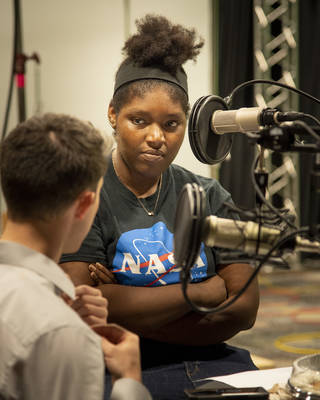
Alex Perryman:I almost applied.
Host:Really?
Alex Perryman:Yeah, I was convinced. I was like, “I might can do this.”
[ Laughter ]
Dan Huot:I think — what was it — 18,000 people applied, which was a record, and 12 got selected.
Host:Twelve.
Dan Huot:Which, when you look at the resumes for those 12 —
Host:It made sense.
Dan Huot:It makes a lot of sense. [Laughs] It kind of makes you question what you’ve done with your life because they’re just — overachiever doesn’t even start just because they’ve already done so much and now they’re astronauts or now they’re going to be restaurants. It’s — it’s insane. So yeah, getting to play two truths and a lie with them — that was a treat.
Host:I know. That’s funny. Yeah, I mean, reading their resumes was insane because we did get to — and Me and You Shared This was actually interviewing them on Skype before they came. They were all stationed. They haven’t come to the Johnson Space Center yet to begin all the event. But we were interviewing them, and it was just fantastic to read through their resumes. And here I am telling stories about me sitting on the couch and not going to a career fair. And I’m reading these guys and I’m like, “My gosh, I really need to go back to school.”
Dan Huot:That was so much fun, though. That wasn’t a podcast thing. But as a random aside that was really cool because we got to talk to these people right after they got a phone call everybody wishes they could get in their life. Like hey, “Want to come be an astronaut?”
[ Laughter ] Let me think about it, no — yes. And so we got to talk to those people, you know, within days or a week of them finding out. That was — you could feel the emotion.
Alex Perryman:It was nice. Like, you’re smiling, they’re smiling. Everyone’s just happy.
Dan Huot:Yeah, we’re all just so happy together.
[ Laughter ] Yeah.
Host:It was really exciting. And it was well-timed, too. That was the very next episode, actually, was good timing. Shane Kimbrough came back. He had just landed from space. He flew back and was here the very next day. And then the very next day after that, I got to interview him about how that landing experience — so it was, like, as fresh as you could possibly make it for Here and Houston, like, we got to hear him talking about coming down from space. And I was — I only got ten minutes, but man, it was —
Alex Perryman:It was a nice ten minutes.
Host:It was, it was really good.
[ Music ]
Shane Kimbrough: Oh yeah. No doubt.
Host:How did that feel?
Shane Kimbrough: I’ve heard it called, like, a really bad car crash, and now I can confirm that that is accurate.
Host:Wow.
Shane Kimbrough: So you hit just really hard. In our case we hit twice really hard.
Host:Oh. And then you rolled around?
Shane Kimbrough: And then we rolled some more, too, just for added effects.
[ Music ]
Host:I just — I felt bad because I had, like, a script of questions that I needed to ask him.
Alex Perryman:You asked him about food.
Host:I asked him about food, of course. But I forgot to ask him how he was feeling until the very end of my questioning. I was like, “Oh my gosh, that should be question number one: Man, how are you doing? You just came back from space, are you feeling good?” But he was, he was talking about he was already back at the gym day two, you know? Already back and starting to recondition himself. So just to hear what these guys do. And, again, I’m on the couch. You know? Just saying. How about you guys? I mean, I’m just going through episodes one through three, but do you guys have a favorite episode?
Dan Huot:Live from Space.
Host:Oh my — how did [Laughs].
Dan Huot:We’re not all is equally blessed as Alex to where we get to talk to space all the time. It’s kind of a rare occurrence for the rest of humanity. And so when we got to talk to Jack Fischer, who — my all-time favorite astronaut —
Alex Perryman:Yeah, that guy’s awesome.
Dan Huot:— we got to talk to him in space, that was pretty surreal.
Host:That was. And that one was — we did it live. The whole thing was live. We did a video. So we actually get to see — we had a special set for the podcast. And, you know, we had this open air where me and you were kind of telling stories about who he is, and you told the stories the first time you met. It’s just, like, we know he’s going to be engaging because he’s just in the past has just been incredibly fun to listen to and he comes up with crazy stuff. And right up front he goes, “By the way, for every question you ask me, I’m going to switch walls.”
Alex Perryman:Yeah.
Host:And so if you take snapshots from that episode, every single snapshot will probably be him on a different position, wall, orientation.
Alex Perryman:Just bouncing around like Spiderman. It was awesome.
Host:It was so fun.
[ Music ]
Jack Fischer: It’s awesome like it is every day. And what I was going to do just because, you know, it is your first guest from space, every single question I’m going to go on a different, you know, wall. So I’ll be on the walls, I’ll be on the ceiling. I’m going to — I’m going to adjust orientation mid-interview at every question just because I can and it’s cool.
[ Music ]
Host:We got to do it again — not with you the next time, Dan, but we did it with Megan Sumner and I got to talk to four astronauts. And that was —
Alex Perryman:Yeah, photography, right?
Host:About photography. And it was great because all of them were really passionate about that stuff.
Alex Perryman:Oh, yeah.
Host:Paolo Nespoli actually took the red camera and pointed it outside and he was talking about taking 4K footage of the Earth, which we obviously love. And then they actually took [Laughs] — pulled out camera and started taking snapshots just randomly of the event. But it was just awesome. They were all fully engaged, all four of them. It was — yeah, it was Nespoli, Mark Vande Hei, Joe Acaba, and Randy Bresnik.
[ Music ]
Paolo Nespoli: Yes, so we do have — for still photography, we essentially have a Nikon camera. Right now we have several D4. Each one of us gets his own, plus we have a couple placed strategically. Some of them are dedicate for special photography like macrophotography. We need to do a lot of macrophotography for equipment here.
[ Music ]
Alex Perryman:That episode that I really liked was Rocket on a Rocket.
Host:Oh, yeah.
Alex Perryman:Like, I feel like if there’s ever an episode that I can quote to people to make myself feel as smart as other people feel that I need to be since I work at NASA, a Rocket on a Rocket is my go-to episode. Because that’s where things clicked like, from, like, you know, the catchy — oh, it’s a rocket on a rocket. Really, we’re talking about launch/abort system. I was like, “Oh my gosh, I get it. I get it. I can make [inaudible] references, I’m smart.”
Host:Yeah [Laughs].
Alex Perryman:I love that episode.
Host:Wahab was such a great guest, too. Because I asked him up front during the podcast, I said, “You know, I want to call this a rocket on a rocket.” I was like, “Is that fair, is that accurate?” He’s like, “You know, when I saw that, when you sent the script to me,” he’s like, “I thought about it and yes, absolutely. It is definitely a rocket on a rocket.” But it’s just so funny because it’s, like, his world. But I don’t think he would have called it a rocket on a rocket. You know, he thinks about the launch/abort. He’s into the intricate details. But if you pull back, yes, if you’re launching on a rocket, this is something that is a rocket that will launch, like, from a speeding rocket. It’s crazy. That one is — it was definitely one of my favorite conversations, too because he did such a good job of describing of, like, how it all works. And you’re right.
Alex Perryman:I think that’s the reason why it clicked with me so much. And so I’m, like, walking around, I hear people talking about him like, “Oh, you’re talking about a Rocket on a Rocket?” And they’re like what? And I was like, “Oh, no. It’s fine.” I’m right. It’s fine.
Host:Oh, yeah.
[ Music ]
Wahab Alshahin: When you told me that you were trying to call it a rocket on a rocket, I thought about that, and then I thought about the specifications for what this thing actually does.
Host:Yeah.
Wahab Alshahin: It’s 30 feet tall, it produces 400,000 pounds-plus of thrust. That is basically — at that point, yes, that is a rocket that is sitting on top of an even larger rocket. Yeah. So certainly that’s a fair assessment.
[ Music ]
Host:I think when we first started this, I was kind of — I was kind of up in the air of how popular it was going to get, you know? How many people are going to listen to this? But it just so happened that, you know, like you said, July is when it first came out. August was when the total eclipse over America —
Alex Perryman:Oh yeah.
Host:— was coming across. And that was such a huge event for NASA. For those of you who don’t know, I mean, the total solar eclipse went across the United States and only across the United States, right? It was only in totality within US territory. And, like, we just blew it up, right? We turned it into this huge event. We went across the country and just sort of did live coverage. NASA.gov exploded in terms of viewership. Unmatched viewership. Like, we totally shattered any record of NASA.gov traffic before that. It just so happened that Houston, We Have a Podcast was — had a total solar eclipse episode that was on the front page of NASA.gov whenever the total solar eclipse was coming. So that gave us a real nice boost.
Alex Perryman:Oh, yeah.
Host:And that was a good conversation, too. I mean, he was an eclipse expert and came with this huge binder of material. Do you remember that?
Alex Perryman:Yes.
Host:And he — like, he actually had a setup right here. But he turned to the side from the microphone and we gave him another table, and he spread out all of this information because he had so much he wanted to go over. I barely got a question in because he was like, “And the next thing I wanted to tell you.”
Dan Huot:He was prepared.
Host:He was. That was great.
Alex Perryman:But it was filled with really, really good information, especially the safety information, which was really nice. I remember friends that listened to that, they were that saying oh, they didn’t know they can’t just go out there and look at it in normal sunglasses. It’s probably not a good idea. But listening to the podcast, they can.
[ Music ]
Host:All it. Let’s do it. However you want to start.
Mark Matney: Let’s talk about safety a little bit.
Host:Okay, safety.
Mark Matney: Everybody has heard don’t look at an eclipse, you’ll go blind, right? We’ve all heard that.
Host:Yeah.
Mark Matney: And I remember as a boy puzzling and puzzling over that. What is it about an eclipse that makes it so dangerous? Well, is turns out you don’t want to stare at the sun ever.
[ Music ]
Dan Huot:Did you guys actually get to see the eclipse, though? Or were you here in Houston?
Host:I was here in Houston, so I only saw part of it.
Alex Perryman:Yeah, I stepped out and I was just like okay. Because we had — I had — we were live. We were live on air.
Host:You went out, though, didn’t you?
Dan Huot:I did.
Host:How was it?
Dan Huot:I abandoned my fellow NASA colleagues and I went to [inaudible]. So I think Houston was about 70% or so?
Alex Perryman:Yeah, it was pretty decent.
Dan Huot:It looked like — well, you say that, but you’re wrong.
[ Laughter ] Because it probably got a little bit shady or something maybe.
Host:Actually, no the sky — I mean, if you really paid attention maybe. But, like, it looked pretty much the same.
Alex Perryman:I only saw it for, like, 20 seconds and I had to run back upstairs.
Host:Well, I put on my glasses and I could tell. But, like, you know, the sky kind of looked the same to me.
Dan Huot:So I went on a trip to the middle of nowhere in Kentucky. And this is going to be kind of a long aside, but I think it’s worth it because if you have the chance to see a total solar eclipse, drop what you’re doing and go somewhere where you can watch it. Because, I mean, I’ve seen rocket launches, I’ve seen Soyuz landings, you know, all this crazy stuff — that was one of the coolest things I’ve ever seen in my entire life.
Host:Wow.
Dan Huot:I went with a group of friends out to the middle of nowhere. I got a bunch of really nerdy friends who calculated, you know, exactly where it will have the longest viewing point and they narrowed it down using maps to this cornfield in this, you know, very small town in Kentucky. And we showed up and a guy had already rented out a farmer’s cornfield, gave the farmer $1,000 and didn’t let anybody else come on the cornfield with him. So we were right across the street in somebody’s front yard. But it’s this really surreal experience where it — colors start to change all around you. And this is — it gets a little bit darker and a little bit darker. And there’s this moment where all of the bugs — you didn’t realize but there’s bugs and there’s just noise and everything — it all just went completely silent. And it was totally eerie and kind of freaky. And then when it actually goes into totality and you can finally take the glasses off and just stare at the sun safely, it’s — it’s weird.
It’s weird. It’s really hard to describe, but it’s — it’s a totally cool moment. It’s a primal moment where you almost automatically start thinking, you know, what did people hundreds and thousands of years ago that this happened, look up at the sky and think the world was ending? Because you almost get that feeling. Like, this should not be happening.
[ Laughter ] And then it lasts a couple of minutes. And then it’s done. And we have another one coming up in 2024, I think?
Host:Yeah.
Alex Perryman:That’s going to actually come through Houston, isn’t it?
Host:I think it’s more Austin, San Antonio.
Dan Huot:It will come through Texas, but it will come across the US again. So anybody listening, start making plans for 2024. Go out and see the total solar eclipse, you will not regret it.
Host:And I think that one’s suppose to be longer totality. I think yours was only, like, two minutes; I think this one’s, like, four — close to four or something.
Dan Huot:So it will be twice as cool.
Host:Yeah, yeah. That just sounds surreal. I think that was one of the stories was, like, two armies were, like, about to battle, and then a total solar — this is, like, hundreds of years ago. I’m going to butcher this story, by the way, because I don’t really know all the details.
Dan Huot:Just start making up random fantastical stuff.
Host:Yeah. But so total solar eclipse happened. And they kind of looked up, the total solar eclipse passed, and they canceled the battle. Like, “Oh, that’s a sign. We’re not going to fight today.” I wish I knew more information about that story. But yeah — no, it sounds surreal.
Dan Huot:This story brought to you by Garypedia.
Host:Yeah [Laughs].
Alex Perryman:I love it.
Host:So the very next — the very next one after eclipse, this one was fun, was when Styx came.
Alex Perryman:Oh, yeah.
Host:Yeah. They were on tour and they had a free day. So we coordinated to bring them here on site. And I helped out with the tour just like we do for many VIP tours. But they actually sat down and we had a conversation. And that was definitely one of my favorite conversations. Because we just brought two members of Styx and then two I’ll call them exploration experts. Like, they actually study what it takes to go explore the cosmos. And we talked about just that, you know? So if we were to land on Mars, what kind of things will we need or the — Styx was asking questions. They were fully engaged. We were talking about going to Mars, we talked about going out to Pluto and selfishly to the moon of Pluto, Styx. You know? Like, what would that even look like? Just like these — these kind of weird concepts of yeah, so if we did go out to the sort of Kuiper Belt are, like, what would a human mission kind of look like?
The answer would be very difficult. But yeah, we had the experts there and actually had a fantastic conversation.
Alex Perryman:I ended up getting a guitar pick —
Host:Really?
Alex Perryman:— as a gift. And that was exciting. I still have it.
[ Laughter ]
Host:Really? That’s so great. Yeah, that was — that was definitely one of my favorite episode for sure. Because we sat — it was different because we have — right now we’re kind of in a — it’s the three of us, right? And we have this circular stables we have mics at three of us. But this one we just sort of sat and you set up some booms, like, around. And we just sat in a circle.
Alex Perryman:It was six people.
Host:Yeah, six people, right? And we sat in a circle and just had a conversation. And it was awesome. We got another one coming up soon here where we’re going to do that again. But yeah, I mean, I love that kind of — where everyone can just chime in. Because you can tell it was kind of a rocky start because everyone’s just kind of like, “What is this going to look like?” And then eventually I couldn’t get anyone to shut up, you know? So it was great.
[ Music ]
[ Inaudible ]
Tommy Shaw: If you were going to vacation and you were in the area, you’d go to Pluto and you’d take some snapshots.
Host:Yeah, see it from the surface.
Lawrence Gowan: I don’t know, I think with a little work, we could buff it up and make it a holiday destination.
Tommy Shaw: It’s a fixer-upper. There’s no doubt about it.
Lawrence Gowan: Handyman’s dream.
John Connolly: It’s about the size of downtown, Chicago, by the way.
Lawrence Gowan: Is it?
Glenn Lutz:Yeah, it’s not too big.
John Connolly: Yeah, it’s not that big.
Lawrence Gowan: Chicago’s nice. [Laughs]
John Connolly: Yeah, yeah.
Glenn Lutz: A frozen Chicago.
[ Multiple Speakers ]
[ Music ]
Dan Huot:Did you guys do an episode during Harvey?
Alex Perryman:Gary did, yeah.
Host:So [Laughs] it was funny — well, I wouldn’t say funny because I couldn’t get here.
Alex Perryman:Yeah. Me, either. I was in Dallas.
Host:Yeah, NASA was straight up closed. And I live right off of Buffalo Bayou. So when Harvey hit, it’s kind of this river and all the floodgates dump into this river. And so the floodgates got filled up. So they let them loose on Buffalo Bayou. And the whole thing flooded to levels I’ve never seen. It’s flooded once before since I’ve lived there, but not to this level. And so the road that I usually take to get to NASA was completely under water. So I wasn’t going anywhere. At that time, I mean, it wasn’t long that we had started the podcast. It was only, like, two months or something. But was like — I think it’s appropriate to say something about it because just to acknowledge that this is happening. So a couple days afterwards the levels started going down and people were kind of all over the streets just checking out the area because everything had been under water for two, three straight days. And so I just kind of recorded, like, an update, just like, “Here’s what happened, guys. A lot of things happened. People lost their lives within Houston.
And, you know, a lot of people were affected, especially, you know, homes in one way or another,” and just sort of just acknowledge that. But I went out with a — I had a portable audio recorder, my own personal one. And I just recorded — I wrote a script and printed out an update. I mean, it was really hard to work, you know?
Alex Perryman:Yeah.
Host:Just because everyone was out of commission pretty much. But I figured this was the right thing to do. So I actually walked across the bridge to Buffalo Bayou and I recorded it on the bridge. I was right — and the water was right underneath me. And the sidewalks — where it was supposed to be the sidewalks were completely under water right next to me but I was on the bridge. And I recorded it right there on Buffalo Bayou, so I recorded it outside. But it was just, like, a two-minute update. But I could successfully say that we never missed a week.
Alex Perryman:We did not, not even for a hurricane.
Host:That’s right, we never missed a week. That was crazy.
[ Music ]
Host:But if there’s one good thing that came out of this disaster, it’s learning that Houston is full of some incredible people and spaceship Earth is not such a bad place to live. Local first responders and Coast Guard were helping those in need, and even Texas civilians grabbed their trucks and boats to aid in these efforts. At NASA’s Johnson Space Center’s flight controllers braved the weather and camped out in mission control 24/7 to made sure the crew members aboard the International Space Station were safe and well.
[ Music ] I think another thing was, you know, we had a lot of the changes just throughout the whole — the whole time that we were here for a year. We had — first we were in Studio B, remember that?
Alex Perryman:Yes, the other studio.
Host:And the podcast setup was interesting.
Dan Huot:Where it was warmer.
Alex Perryman:It was warmer, but it was louder.
Host:But, you know, because we had never started a podcast before, we had very limited equipment. We have these mics. But actually, I can see the table right now. It’s this really small wooden table. And we just clamped the mics to the side of that table. There’s barely enough room for two pieces of paper. And we had our conversations in the back of Studio B because it was next to some sound buffers or something. But I think we did a couple episodes there and they turned out okay, but the fan —
Alex Perryman:It just got ridiculous.
Host:Yeah, it got ridiculous.
Alex Perryman:The summer and it was trying to cool everything off.
Host:Yeah, I mean, it started getting a little bit annoying.
Alex Perryman: It would just kick on randomly and it’s like, “Well, I hope we’re done with this episode.”
[ Laughter ]
Host:So that’s — that’s when we went so the sound booth.
Alex Perryman:Yeah, it was a little bit warmer, cozy.
Dan Huot:Cozy’s the operative word.
Host:You did a couple in there.
Dan Huot:Yeah, I did a couple in there, which I didn’t mind it too much. But I don’t know if it’s just me, but you almost start to get uncomfortable when you’re in a sound booth after a while.
Alex Perryman:Yeah, it’s just — because it’s totally quiet.
Dan Huot:It’s too quiet.
Host:Yeah. I mean, the levels are great, but the way our sound booth is situated, you got this big desk at the corner, right? And we have interpreters sit there and they’re looking at the screen And they have all their papers out. It makes sense. But for a conversation where you have to turn your head for the whole — I mean, the mic is over here, you have to turn your head, I mean, the sound was bouncing everywhere.
Alex Perryman:There’s a giant window.
Host:It was already pretty tight. So now we’re doing it in Studio A. And I want to bigger table. This is a nice table right higher.
Alex Perryman:We’re getting there. We’re slowly moving up. It’s a little cold in here, but it will even out.
Host:That’s why for all of our guest now whenever we invite them, I’m like, “Bring a jacket.”
[ Laughter ]
Dan Huot:Trust me.
Host:But it’s July. I was like, “Bring a jacket.”
Alex Perryman:You’ll want a jacket. And you’ll want July heat when you leave out of here.
Host:Oh. Dan, do you have any guests that sort of stick out whenever you think about the folks that you’ve actually sat down and you’ve interviewed?
Dan Huot:A couple.
Host:Yeah?
Dan Huot:Probably the three most recent ones — well, three of the most recent ones that I did which were in the booth. I got to talk to Drew and Ricky before their flights. And those were really cool. Drew has this crazy, elaborate, reaching back to the early 1900 story of how he got to where he got. And that was really cool to hear. And then Ricky Arnold has taught in schools all over the planet and just shared his experience of what it was like getting off the plane for the first time in Morocco as a 20-something and just being —
Alex Perryman:Yeah, international band.
Dan Huot:Yeah, totally fish out of water in all these different places. It’s always cool to talk to an astronaut.
Host:Oh, yeah.
Dan Huot:Because they all have these super diverse, super unique backgrounds. They’ll have some of the same resume things, like, a lot of them are pilots or something. But just the path that they took to become that is always unique. And it kind of helps you realize, you know, no matter where you’re starting, this is where you can end up.
Host:Yeah.
Alex Perryman:Right.
Dan Huot:The other one I really liked was I talked to Scott Smith, the nutritionist. And as somebody who as horrendous diet [Laughs] you never really think about just all of the different aspects of your health that what — the food that you’re putting into your body can affect. And just the level of what they’re tracking for the astronauts in space is unreal, that they’re able to track all of these individual aspects of the food just to keep the crew members healthy. And then the stuff he was talking about for the vision changes is really cool. Because vision changes, for anybody that kind of follows along, that’s one of the big kind of gremlins out there for what happens to humans in space that we have to solve before we, you know, send people on to Mars for three years. And there’s a lot of theories out there about why it’s happening, but they’ve actually been finding this genetic reason that could potentially, you know, give us an advance warning that hey, you might be susceptible to this.
And it will have effects for people here on Earth because it’s linked to another disease. And all this crazy stuff. And coming in, like, his title is he’s a bio — bio what is it? Biochemical nutritionist or something.
Host:Yeah, yeah.
Dan Huot:Something of that nature. You wouldn’t normally expect from the title to sit there and learn about that, but that’s what he’s working on.
Host:Right.
Dan Huot:And that was eye-opening.
[00:47:40]
[ Music ]
Scott Smith: Changes in some of their hormones. There’s a list of about eight or nine things that we had that we found a clinical population that had the exact same set of characteristics. And that is women with polycystic ovary syndrome.
Dan Huot:Really?
Scott Smith: Really. Polycystic ovary syndrome or PCOS as they call it is the leading cause of infertility in women. It affects 10% to 20% of women which is a staggering incidence.
[ Music ]
Dan Huot:I’m jealous, though, you got to talk to Ginger.
Alex Perryman:Ginger is awesome.
Dan Huot:And Ginger is one of the coolest people on the face of the planet.
Host:You know, I mean, it would be a totally different story, but Alex and I were talking afterwards after we recorded that episode. That was part of the Women’s History Month episodes. She was one of our four guests. And I kind of wish we just — the podcast, her segment was the 20 minutes, 25 minutes we spent after the podcast.
Alex Perryman:Yes.
Host:She was just — first of all, her story — I wish I included both, how about that? Because her story was just incredible. Just a roller coaster of emotion and start to finish, just incredible. But oh yeah, afterwards it was so great because we put down — we turned off the recording, right?
Alex Perryman:Yeah.
Host:And Ginger had actually attended because I say it’s cold, but it’s an audio podcast. I was like, “There’s no specific attire.” She came in gym clothes.
Alex Perryman:Yeah. She went straight to gym afterwards.
Host:She’s like, “I’m going to the gym right after this. So this makes the most sense.” But we were just chatting and we were talking about — like, she got an email notification while we were chatting, right? And it was for a concert that was coming up. And she’s like, “I really want to go to this concert.” And so she start texting her friend, “Do you want to go with me?” And next thing you know, she’s pulling up and she’s buying tickets, right?
Alex Perryman:Yes.
Host:And then she’s like, “Have you heard of this artist before?” Like, I don’t think — and she’s like, “Oh, I love it.” And then she puts down her phone and we just start jamming for a couple minutes.
Alex Perryman:It’s the best.
Host:It was great.
Alex Perryman:I was so mad I turned the recorder off. I was like, “I can’t believe I did that.” I never turn it off when, like, normally I just keep it rolling and it’s like I’ll have buffer room at the end. But I cut it off, and I don’t know what I was thinking.
Dan Huot:Yeah. She’s one of the most, like, objectively cool people that you’ll ever meet in your life. But she’s also insanely driven, insanely intelligent.
Host:Oh, yeah.
Dan Huot:And capable and was a flight director and all this crazy stuff.
Host:Yeah.
Dan Huot:And then she could sit there and introduce you to cool new bands.
Host:Yeah [Laughs]. Just super personable. But yeah, her story was great. And she never gave up. She always just pushed forward. It was an amazing story to hear.
Dan Huot:Go listen to Ginger’s episode.
Host:Yeah. That one was good, Stories of Her Strength is the name of the episode.
Alex Perryman: Yes.
[ Music ]
Host: Was it this goal that you had in the back of your mind that really helped you to kind of excel? Because you graduated in the second of your class in high school, right?
Ginger Kerrick: Yes, yes. By one one thousandth of a point, not that I carry that with me to this day. But —
[ Music ]
Host:You know, you were talking about Scott Smith, how — you know, just learning his perspective and you’re thinking about your own diet whenever you’re thinking about nutrition. And that was the same thing that happened whenever we had Andrea Hanson in here to talk about exercise. That was a good one. She talked about what the astronauts have to do to exercise and why they exercise, really to mitigate some of the bone and muscle loss that they have. But I asked her, I was like, “What do you take out of this? Being a person, an expert, what are you taking out of this?” And she goes, “Actually, because the folks on the ground are helping the astronauts so much, I have actually — I actually have my own personal trainer because I realize how important that is.” It was an interesting perspective. Because I was like, “Huh, I wouldn’t have thought that.” I thought it would have been a technique or a routine. But it’s, like, the whole personal trainer aspect. She’s like, “I get that now.”
Alex Perryman:That makes sense.
Host:Yeah, that makes sense to me.
[ Music ]
Andrea Hanson: And so one thing I’ve taken away is I do hire a trainer to help me work out so that I’m make sure that I’m pushing myself and somebody’s there to help keep me motivated along the way.
[ Music ]
Host:Poor Andrea, though, because that was the one where Greg — oh my gosh.
Alex Perryman:The one time I take a vacation.
Host:Yeah, Alex took a vacation. Where were you going? You were actually speaking.
Alex Perryman:I was speaking at Full Sail University. So I was — I was down there for Hall of Fame Week. And I got a lovely email from Greg [Laughs] explaining to me don’t panic, I’ve handled it, but we’re going to have to rerecord this podcast [inaudible]. We don’t do that. I mean, it’s not live, but we get one take.
Host:But yeah — no, that was — the file came in corrupt the way that it was recorded. That was another one we did in the sound booth. And I felt so bad. I was like, “Andrea,” I was like, “You did a great job.”
Alex Perryman:The odds of that happening are so slim.
Host:I know.
Dan Huot:You did so great, now come do it again.
[ Laughter ]
Host:So we had to rerecord the whole thing. And she had no problems at all. She was like, “I understand, absolutely, thank you for coming.” She was really, really cool about it.
Alex Perryman:That’s awesome.
Host:But that’s not the only time that we’ve had a close call. While that one was not even a close call, Greg just —
Dan Huot:That was a call.
Host:That was a call.
Alex Perryman:It was a call. Close call was episodes being deleted that weren’t released yet, close call.
Host:Oh, yeah.
Alex Perryman:That was —
Dan Huot:Who did that? Gary.
Alex Perryman:Gary’s like, “Don’t look at me.”
Host:Don’t look at me, I don’t touch that. Although I did have to record one episode. I’ll get to that after this story.
Alex Perryman:But yeah, so John was using our recorder for something. And he reformatted the recorder. I didn’t know that he was going to reformat the recorder because we had just recorded an episode the day before and he wanted to use the recorder the next morning. And I was like, “Oh, that’s fine. I’ll just pull the episodes off.” He’s just going to record something. I marked my numbers, I know where it’s at. I get the recorder back and I’m, like, “Hey, John, did you pull everything? Because there’s nothing on it.” He’s like, “No, no, I reformatted it.” I was like, “Oh. Oh no.”
Dan Huot:Oh, no.
Alex Perryman:And so I went panicking and it was — I think it was, like, game two of NBA playoffs. Throughout the entire game I literally have the recorder to some program trying to recover files. And it took the entire game — the entire Rockets game for it to find the files. And it found them and I got the files back. I’m still amazed that it happened. I’m pretty sure that’s where audio wizard comes from because that was pure magic.
Host:Yep, that is where it comes from.
Alex Perryman:The fact that every single file that we’ve ever record on there came back. And that’s hundreds of files. And so I’m just, you know, I’m glad that software was there. I would never like to go through that experience again. I didn’t know how to tell Gary. Like, I was just sitting there because we recorded another episode, and I didn’t want to tell him before the episode. So I’m just sitting there look at him like, “I am so sorry.”
Dan Huot:Great job. By the way, everything you did last week is completely gone. Bye.
Host:Okay, bye. Yeah, right?
Alex Perryman:I was like, “Don’t worry, I got a plan. Hopefully this will work.”
Host:Oh, actually, I don’t think you told me until after you recovered them.
Alex Perryman:Yeah, that’s right. I did not tell him until after I recovered it.
Host:That was a smart move to do.
Alex Perryman:I just waited. I was like, “But I have the files now. Don’t worry [Laughs].”
Host:That was the strategy I did with my mom whenever I went skydiving the first time.
Alex Perryman:There you go.
Host:I went skydiving, I went on the ground, and then I called my mom. I was like, “Mom, I went skydiving.” She’s like, “You did what?”
[ Laughter ] I was like, “But I’m on the ground now, so you can’t yell at me.” She’s like, “Oh, but I will.”
[ Multiple Speakers ] Some of the other folks that we have now. So first of all, the shout-out to — even though Greg lost that episode [Laughs] shout out —
Dan Huot:Not holding any grudges.
Host:Yeah, not holding any grudges, I definitely have forgiven him. But he made the music for Houston, We Have a Podcast. And that’s great music. The intro stuff?
Dan Huot:Oh, yeah.
Host:With the splashes of actual historical audio from missions — really, really cool. One small step for man, you know, he’s got all that in there. It’s great. Matt McKenzie, who actually was an intern for me back, oh my gosh, I think almost two years ago at this point.
Alex Perryman:Yes.
Host:It was two years ago. Made the thumbnail. So I’d like to thank him for that for sure. And, you know, you were talking to Pat earlier. Pat’s off here to the side. He’s one of our new producers for Houston, We Have a Podcast, as well as Bill Stafford, who actually does all of the posting and —
Dan Huot:Click, click, click.
Host:Yeah, all that clicking.
Dan Huot:Taking awkward pictures of us [Laughs].
Host:So I’d like to thank them for joining the team. Because for the longest time, I mean, Alex, it was pretty much just me and you just kind of running the show.
Alex Perryman:Yep.
Host:That was — that was tough. But yeah, here we are, 52 episodes later and a lot more to come.
Dan Huot:Pretty soon we’ll get Pat to host one.
Host:That’s right, the golden voice.
Dan Huot:Get that golden radio voice.
Host:Golden radio voice.
Dan Huot:Back out on the airwaves where it belongs.
Host:Yeah.
[ Laughter ]
>> Thank you.
[ Laughter ]
Host:Golden voice, everybody. All right. I’m going to open this. It’s probably going to make a lot of noise. While we’re doing that, I wanted to tell everyone that a lot of the episodes that we did throughout our 52 episodes were suggestions from you.
Alex Perryman:Yep.
Host:One of my favorites, actually, was spacesuits. Someone suggested spacesuits, and I was like, “Oh my gosh, of course we have to have a spacesuits episode.” So we brought on Les Padilla, hardware manager for the EMU, which is the suit they have up on the Space Station right now. That’s the one they actually go outside the Space Station and work outside in. And we just had a chat about what spacesuits are all about. So if you like the show, please give us suggestions on what you would like to listen to and we will actually pay attention to those. The way I’ve been doing it is you have to type in Houston, We Have a Podcast to, like, Twitter or Facebook or something because that’s what I do. I just kind of, like, search that within the social media platform. Like, “Oh, that’s a really good idea.” What was the other one we did? BEAM.
Alex Perryman:BEAM, yeah.
Host:BEAM was another suggestion. I was like, “Oh yeah, we should totally do one on BEAM.” Because at the time the actual studies had sort of wrapped up. And now it’s there as, like, a storage unit on the Space Station. So that one’s pretty cool. And then also, this one would actually be really helpful for us, too, is rate us. Five stars would be preferred. But, you know, whatever you think. If you really enjoy the podcast, that actually helps us say to our managers, “Hey, look, people really like this and we should continue to do it.” So please leave some stars and then any comments you have for us, both praise and anything critical. Because we will pay attention to that and kind of fix it along the way. Have we? I think we’ve made a couple fixes.
Alex Perryman:Yeah, the room change was one of them.
Host:The room change was definitely one of them, yeah, and the mic. And we actually have a — we have a third mic right now, and we’re hopefully going to get some more. But yeah, if you want to see more, like, video episodes or if you want to do —
Dan Huot:Yeah, those would be fun.
Host:Longer, shorter, if you have a topic, you know, just leave them there. And I’ll end by saying thank you to Alex for sticking with me the whole time and dealing with all of my stuff.
Alex Perryman:Yay.
Dan Huot:Yay.
Host:All of my nagging, “Hey, did you send the transcription yet? Hey, when is this going to be edited? Hey, can I get — ” yeah, so anyway.
Alex Perryman:I just need to edit this. It’s 2.5 seconds right here and we should be good. We should be good.
Host:And for Dan because I can’t do this all by myself. So thank you for coming on and hosting and being a part of it and helping to get it off the ground.
Dan Huot:I mean, I do the easy stuff. So.
[ Laughter ] No, I would thank you guys because you built this from scratch. And now we’re 52 episodes in. And we have a cake. So you did a really good.
Host:Awesome.
Alex Perryman:Thank you.
Host:Cool. All right, I think we’ll end there. And oh yeah. Well, okay, the final thank you is to you, the listener. Thank you for tuning in. Thank you for subscribing. Thank you for listening to our show and keeping us going and giving us feedback so that we can continue to do this.
Alex Perryman:Yay.
Host:Yay.
[ Whistles ]
[ Laughter ]
Dan Huot:Cake.
Alex Perryman:You can press the red button now, Pat.
[ Music ]
Host:Hey, thanks for sticking around. We had a lot of the fun recording this annual episode — well, the one-year birthday episode of Houston, We Have a Podcast. And I’m glad I got to sit with my team. And really, thanks to Alex for sticking with me through the whole thing and dealing with all of my crap. She’s sitting right next to me [Laughs], constantly bugging her every single week. “Hey, is the transcript ready? Hey, is the episode ready?” So it’s been quite a ride. And then Dan just helping out from start to finish, just making sure that it’s successful all the way through. So also one thing I forgot to mention during the episode was a huge thanks to NASA in Silicon Valley podcast for our friends over at Ames. Whenever we were starting the podcast, I kind of didn’t really understand fully how to do it the NASA way, and they already had their established.
So I was actually talking with Matt Buffington and Jerry Colon, some of those guys out there to understand just how do you do this? And they were very helpful along the way. So thanks, guys, if you’re listening. Really appreciate your help. You can go listen to them. That’s NASA in Silicon Valley. Otherwise you can listen to Gravity Assist. That’s our other NASA podcast out at headquarters. And hopefully we’ll have a couple more coming because I’m really digging the whole podcast scene here at NASA. So otherwise you can go to NASA.gov/ISS to get the latest information on the International Space Station. If you’ve noticed through all of our 52 episodes, a lot of them have been directly related to some of the research and the people, actually, that actually go and work on the International Space Station. So you can learn a lot there. We are still taking #AskNASA questions. So use that hashtag and then just make sure to mention Houston, We Have a Podcast and we’ll bring your questions or ideas right on the show.
We even said, you know, the spacesuit episode and the BEAM episode. There’s been a couple others, too, that were directly influenced — space medicine, the one with Natasha Chough, astronaut health, that was another one. Hey, I want to learn what a flight surgeon does. We’re like, “Okay, let’s bring her on.” So yeah, all of these were suggestions from you guys, the listeners that we brought right on the show. So just make sure to mention Houston, We Have a Podcast. And we’ll make more episodes. I mean, we do this every week. So the more you give us, the more we can do. Really appreciate you guys listening, too. It really means a lot to us to help us to keep going. So this birthday episode was recorded on June 20th, 2018. Thanks to Kelly Humphries, Pat Ryan, Bill Stafford. Pat and Bill we actually had in the room with us during the recording. They’re essential to the group right now. And also Greg Wiseman, who has also been helping out. You know, when the audio wizard is not here, Greg come. And he’s just Greg. We have audio wizard and Greg. Thanks always to Alex Perryman and Dan Hewitt. And then thanks to you for listening and helping with the success of the podcast. That helps us to keep going. We’ll be back with a brand new episode next week.

